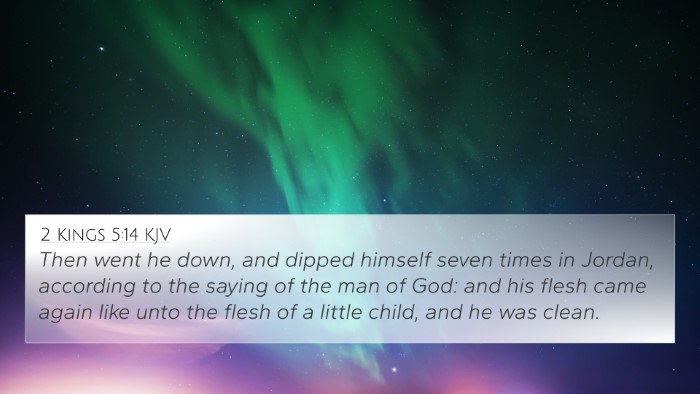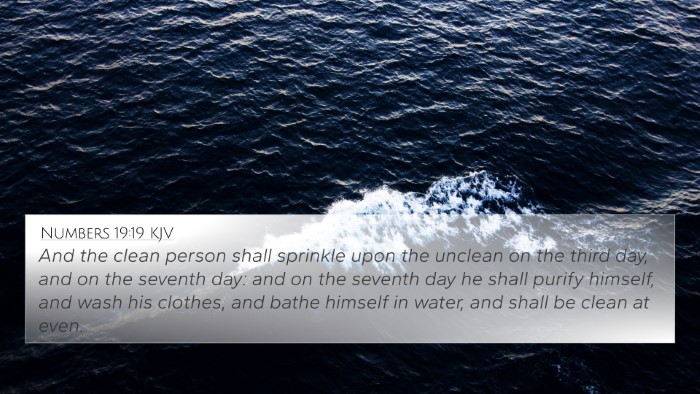Understanding 2 Kings 5:10
2 Kings 5:10 states:
"And Elisha sent a messenger unto him, saying, Go and wash in Jordan seven times, and thy flesh shall come again to thee, and thou shalt be clean."
This verse is part of the narrative of Naaman, a Syrian military commander who sought healing from leprosy through the prophet Elisha.
Summary of Key Themes
- Faith and Obedience: Naaman's healing was contingent upon his obedience to Elisha's directive.
- Simplicity in Divine Instruction: The prescription to wash in the Jordan highlights the often simple means by which God operates.
- Symbol of Humility: Naaman had to humble himself to follow through with Elisha's instructions, which contrasted with his initial expectations.
Interpretations from Commentaries
Matthew Henry’s Commentary
Matthew Henry emphasizes the importance of obedience in faith. He notes that the instruction to wash in the Jordan seven times is God's way of testing Naaman’s faith. Despite Naaman's initial reluctance, it illustrates a profound truth that God often requires simple acts of obedience from us.
Albert Barnes' Notes
Barnes comments on the significance of the number seven, often representing completeness in the Bible. The act of washing symbolizes a complete cleansing by faith. He also observes the geographical and cultural significance of the Jordan River, which suggests a lower status than Naaman was accustomed to, reinforcing the theme of humbling oneself before God.
Adam Clarke's Commentary
Clarke expands on the symbolic meaning of water and its cleansing properties, associating it with both physical and spiritual renewal. He highlights the importance of faith in the process; it is not merely the act of washing that heals but the faith in God’s command.
Cross References Related to 2 Kings 5:10
- Exodus 15:26: God’s promise of healing to His people.
- Leviticus 14:8-9: Instructions for the cleansing of lepers.
- Isaiah 1:16-18: Washing and cleansing as a metaphor for repentance.
- John 9:7: Jesus instructs the blind man to wash in the pool of Siloam.
- James 5:14-15: The prayer of faith that heals the sick.
- Romans 10:17: Faith comes by hearing, reinforcing the necessity of obedience to God’s word.
- Acts 22:16: An instruction to arise and wash, symbolizing spiritual cleansing.
Thematic Connections
This passage has various thematic connections across the Bible:
- Faith and Healing: The connection between physical healing and faith, seen throughout the Gospels.
- Humility and Transformation: A recurring theme where God exalts the humble (James 4:10).
- Obedience as a Path to Restoration: Similar to God’s commandments to Israel leading to blessings (Deuteronomy 28).
Conclusion
2 Kings 5:10 invites reflection on the necessity of humility, faith, and obedience in one’s relationship with God. Through the act of washing, God uses Naaman’s condition as a means to teach important principles that resonate throughout Scripture. Connecting this verse with others provides a deeper understanding of its significance in biblical theology.
Exploring Cross-Referencing Tools
For those interested in a comprehensive study, utilizing cross-reference tools for Bible study can significantly enhance understanding:
- Bible Concordance: A valuable resource to find specific terms and related verses.
- Bible Cross-Reference Guide: Helpful in locating themes and concepts across scripture.
- Cross-Reference Bible Study: Methods for examining scriptures in relation to one another.
Practical Application
To apply the lessons from 2 Kings 5:10, consider engaging in a cross-reference Bible study to explore obedience and faith in your spiritual journey:
- Start with a specific theme or need for God's guidance.
- Identify verses that speak to that theme.
- Reflect on how these passages connect and inform your understanding of God's nature and will.
Thus, 2 Kings 5:10 stands as a poignant reminder of the profound spiritual truths endowed within seemingly simple obedience.



















